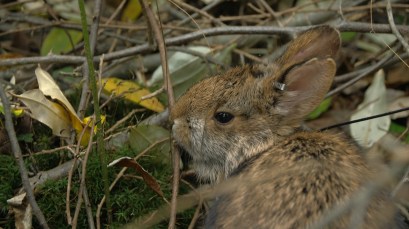CONTACT:
Heidi Holman: (603) 271-3018
June 16, 2021

Concord, NH – Rabbit hemorrhagic disease virus (RHDV2) was first detected in the 1980s and made its way to the United States in 2018. RHDV2 can affect both wild and domestic rabbits. Improper care and handling of pets can result in further spread of this disease. New Hampshire Fish and Game is asking the public to take precautions against transmitting this virus further and potentially bringing it to the state.
RHDV2 can result in very high mortality rates for the animals infected, which is especially concerning for our state endangered rabbit, the New England cottontail. Symptoms include fever, signs of hemorrhages or bleeding, loss of appetite, seizures or uncoordinated movements, breathing difficulty, and lethargy.
New Hampshire Fish and Game staff and agency partners have been working hard to conserve the New England cottontail for the past decade. Over one thousand acres of habitat have been created by private landowners and on public lands. Hundreds of captive-bred rabbits have been released in the region, including some very successful outcomes in the Seacoast region of New Hampshire.
“Despite all of these efforts,” said Heidi Holman, a Nongame Biologist at NH Fish and Game, “if we are not vigilant, the arrival of RHDV2 to our state could undo all of this great work as well as have an impact on other rabbit species.”
To protect our native rabbits and the snowshoe hare, people are asked to:
- Keep all domestic rabbits in confined areas where they cannot interact with wild rabbits.
- When purchasing new rabbits, source them locally to prevent importation of the disease to our state (to see an interactive map of infected locations in the United States visit https://www.aphis.usda.gov/aphis/maps/animal-health/rhd).
- Follow proper techniques when caring for domestic rabbits, including cleaning and sanitizing equipment, clothes, and shoes worn while working with them.
- Do not handle wild rabbits in order to prevent potentially infecting them.
For more information about RHDV2, visit the Northeast Wildlife Disease Cooperative website at https://www.northeastwildlife.org/disease/rabbit-hemorrhagic-disease.
